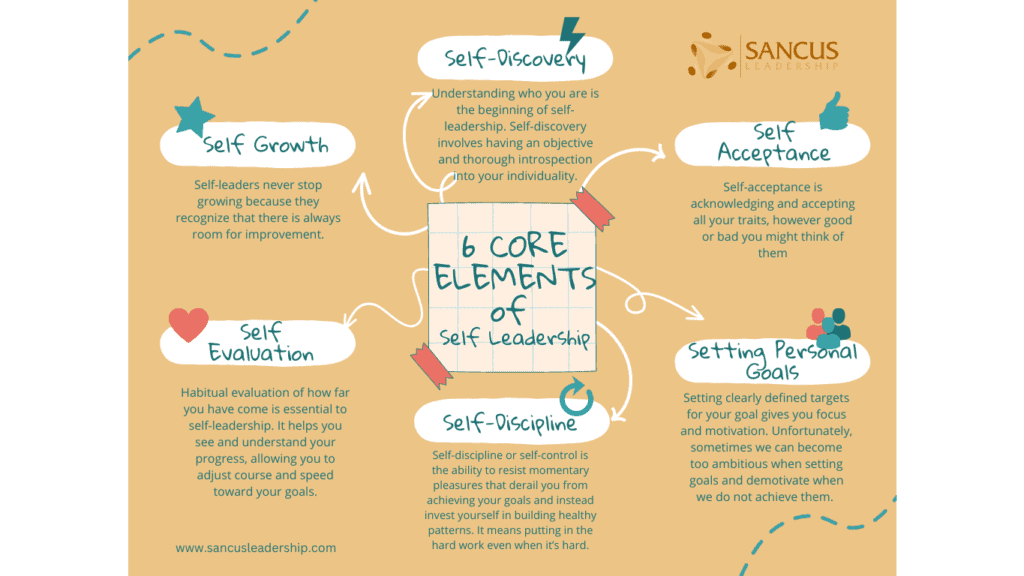Dr. Jordan Peterson famously said, “Set your house in order before criticizing the world,” and Gandhi articulated beautifully, “If you want to change the world, start with yourself.” To lead others effectively (and create the change we wish to see), we must first succeed in leading ourselves. This is the essence of self-leadership, but how does it impact your leadership and business?
Self-leadership is the practice of understanding who you are today and who you want to be in the future, then bridging that gap through self-discipline and self-development. It applies to both individuals and business teams. Any good leader must begin by mastering the art of leading themselves.
As you continue reading, you will learn more about self-leadership and its core elements. I will also cover why self-leadership is essential for leaders and how business teams (especially small teams) can benefit from this critical practice.
The 6 Core Elements of Self-Leadership For Managers and Leaders

In simple terms, self-leadership is the art of leading yourself by directing your thoughts and behavior toward achieving your goals.
In simple terms, self-leadership is the art of leading yourself by directing your thoughts and behavior toward achieving your goals.
I choose the word art with intention; self-leadership, like any other leadership theory, is about human behavior. Although general human behavior can be predicted relatively well (thanks to big data and AI), individuals’ behaviors are incredibly intricate and can’t be understood through simple algorithms.
We do not fully understand what makes great leaders great, but we do know what makes terrible leaders truly terrible: a lack of self-understanding and the inability to build trust with their followers.
Without self-awareness, you don’t know where you are, and if you don’t know where you are, how will you find the best route to where you want to be?
Self-awareness is like creating a map; the more you explore your surroundings, the more detailed the map gets, and once it is good enough, you can start moving effectively toward your goals.
Self-awareness is like creating a map; the more you explore your surroundings, the more detailed the map gets, and once it is good enough, you can start moving effectively toward your goals.
Self-leaders make successful business leaders because they employ their self-awareness and discipline toward setting and meeting their targets. Furthermore, they prioritize their personal development and growth journey to help them improve daily.
“Great leaders never stop improving their map, so their navigation improves with time.”
Here is a funny and invigorating TEDx talk by leadership advisor and award-winning lecturer Lars Sudmann, showing lessons from the golden age of leadership and sharing his strategies on self-leadership to develop yourself into a “Utopia leader.”

The following six principles are the foundations for self-leadership:
1. Self-Discovery (Reflection)
Understanding who you are is the beginning of self-leadership. Self-discovery involves having an objective and thorough introspection into your individuality.
The goal is to understand how you interact with the world and why.
The process of self-discovery involves the following key steps:
- Taking time to reflect and examine your thoughts and actions as if you were watching yourself from an external perspective. Don’t value what you see, hear, and feel. Instead, focus on gathering as many truths about yourself as you can.
- Assess your values and core beliefs and how they influence your decision-making. Look at what you do, different from what you want to do. You are your actions, not your words!
- Identify your passions and interests or the things that you love to do. Everything that gets you emotional is worth looking into. Anger and frustration are excellent indicators of an underlying drive; tap into that energy.
- Study your behavioral and emotional patterns. Feedback from others is a great tool; ask for feedback from people you like, or dislike and anyone who can give you a helpful answer.
- Evaluate your talents and skills or the things you’re good at. Ensure that other people’s opinions matter; if your trusted friends say you are particularly good at something, listen to them. They may be correct.
- Explore and expand your map to know exactly where you want to go. Clearly articulate the hopes and dreams that you have for your business and your life. But don’t take it too seriously; allow your goals to develop as you live and learn.
Self-discovery helps business teams to direct their strengths and talents into making their enterprises thrive. It also helps team leaders to assign roles to each member according to what they excel at.
Self-aware team members are an asset to any business team. They are introspective and take personal responsibility for their shortcomings. They also take on responsibilities that align with their skills and competence, helping them succeed and avoid failure.
When team members are self-aware, the leader can easily assign roles.
2. Self-Acceptance
Self-acceptance is acknowledging and accepting all your traits, however good or bad you might think of them.
Self-acceptance is acknowledging and accepting ALL your traits, whatever you might think of them.
Self-acceptance or contentment only comes when perfection is an illusion, which only exists as an idea and is never found in reality. Consider a circle; the perfect circle can not be created; it’s only a matter of how close we look until we find its flaws.
Everyone is prone to making mistakes, and exercising self-compassion when we fail is vital to becoming better. Instead of seeing your “mistakes” as wrong or right, look at them as a scientist goes about an experiment.
The experiment only fails if the method is defective, but failure is never based on the outcome; the good scientist aims to learn, not prove they are correct. Every experiment comes with lessons, whether the hypothesis is proven correct or not.
Self-acceptance also means prioritizing your journey, letting go of unfavorable comparisons, and appreciating other people even when they outdo us. This may mean avoiding people who cultivate negativity and unhealthy competition.
In business and leadership, Self-Acceptance paves the way for growth. It helps you identify mistakes faster and accept the insights of other team members because you realize that you still need to figure out everything.
3. Setting Personal Goals
Setting clearly defined targets for your goal gives you focus and motivation. Unfortunately, sometimes we can become too ambitious when setting goals and demotivate when we do not achieve them.
There are several okay models to help you set personal goals. I really like and recommend the SMARTER model; it is updated from the old SMART system. It is more effective since it works on the premise that the future is uncertain and unpredictable, so we aim high.
Learning how to set personal goals is crucial to self-management and leadership. Self-leaders who have mastered the skill of personal goal-setting work well in a team because they continually and structurally develop as leaders, becoming more and more efficient as they learn how to lead.
For team leaders, goal setting is a crucial skill. The team may consistently miss their targets because they set unaligned or unattainable goals. With a solid goal-setting skillset, teams can work toward targets directly related to the bigger picture.
4. Self-Discipline
Self-discipline or self-control is the ability to resist momentary pleasures that derail you from achieving your goals and instead invest yourself in building healthy patterns. It means putting in the hard work even when it’s hard.
It means saying no to one marshmallow today so that you can have two marshmallows tomorrow. Follow-up studies of “The Stanford Marshmallow experiment” indicated that those who were able to forfeit instant gratification for delayed gratification had an improvement in positive life outcomes.
For many entrepreneurs, setting goals is exciting because they can envision their desired outcomes. However, when push comes to shove and work demands more and more, they feel defeated and lose sight of the bigger picture.
Developing self-discipline is hard because it means leaving your comfort zone, and your body and mind will not enjoy that. However, remembering the study above, it is paramount for leaders to develop the skill of delayed gratification.
5. Self Evaluation
Habitual evaluation of how far you have come is essential to self-leadership. It helps you see and understand your progress, allowing you to adjust course and speed toward your goals.
Self-evaluation also helps you see whether your current strategies are working and identify improvement areas.
To have an effective self-evaluation, you must remain honest and objective while showing compassion toward yourself where you need to improve. Remember the discussion about the scientist above?
I use morning and night journaling to measure my progress; here are some examples that I ask myself every morning:

Here are some of the follow-up questions I ask myself before going to bed:


As you can see, a mix of quantitative and qualitative questions is asked, and the answers are automatically published in a few graphs and a spreadsheet that I review weekly and monthly.
The absolute numbers don’t matter, but the trends over time indicate where I am headed.
Reach out to me here if you want a copy that you can modify for your needs.
Getting feedback from others is another great way to gain insight, but it needs to come from people you trust and who want to see you achieve your goals.
As a team leader, self-evaluation helps you check whether you are still on track toward the desired end state and how you can help yourself or others to improve themselves. It also serves as a reminder of the bigger picture and the team’s decisiveness to get there.
6. Self Growth
Self-leaders never stop growing because they recognize that there is always room for improvement.
Self-growth or personal development means acquiring any or all of the following:
- New Skills
- New Knowledge
- Different Habits
- Different Attitudes
- New Goals
Self-growth also takes us out of our comfort zone by trying to change and improve the status quo. It is a continuous process that never ends. The goal is to improve a bit every day, not to reach the end goal of perfection. Since as we mentioned earlier, perfection doesn’t exist in the real world.
Within business teams, members who are invested in self-growth are more productive. They are also eager to learn because they acknowledge that it is vital to becoming a better person.
Team leaders who value self-growth continually grow in their knowledge and skills as leaders. They also become better managers of the talents and resources available.
How Business Teams Can Benefit From Self Leadership
Just as individuals benefit significantly from self-leadership, so do business teams and their leaders.
Below are some benefits of self-leadership to business teams and their leaders:
Creates a Culture of Personal Responsibility
A common challenge that prevents teams from successfully meeting their targets is the social loafing phenomenon, which explains that teammates put less effort into teamwork than they would when working alone.
Read more on the social loafing effect and how it is also impacting your team.
On the contrary, team members who are self-leaders take personal responsibility for the team’s success. They exercise self-discipline in all their roles and are committed to a culture of personal excellence. This, of course, helps the team meet its goals.
My last team was just like this, and being the leader was pure excitement!
Self-Leaders Are Team Players
Self-leaders make great team players because they understand they cannot win alone. They appreciate the insights and skills that other team members bring. Other teammates, in turn, feel valued, which nurtures trust and team satisfaction.
Also, self-leaders are mindful and reflective, making them empathetic team members. They also actively listen to others’ feedback, promoting effective team communication.
Self Leaders Are Problem Solvers
Self-leadership cultivates critical thinking and introspection. It also helps team members to be objective when tackling issues because they willingly take accountability and learn from their mistakes.
Self-leaders focus less on passing blame in a crisis and more on identifying the root causes. They acknowledge that problems exist to equip the team with more knowledge and skills for future success.
Self Leaders Have Mastered Their Emotions (High Emotional Intelligence)
In business, many situations can push you to the edge, emotions-wise. You may be grappling with uncooperative teammates stalling the group’s progress or managing heightened emotions resulting from misunderstandings among the teammates.
In such situations, we must exercise self-control and decide calmly and soberly (especially if we are the team leader). Self-leadership will be one of your best tools.
Self-leadership promotes self-control and mastering your own emotions despite turbulent or stressful surroundings. Self-leaders have learned how to silence negative thoughts and calm, strong feelings when dealing with challenging situations, and this helps them thrive.
Self-leaders Are Eager To Learn
Every team can benefit from members who are always seeking to grow their skills and knowledge.
Self-leaders acknowledge that growth comes from constantly learning. This is important for business teams because it helps them stay updated with significant developments. Team members can also feel more confident and motivated to take on challenges because they are more knowledgeable.
Self Leadership Promotes Group Satisfaction
Self-leaders go through a reflective process of self-discovery, which helps them identify what makes them tick. This is important in business teams because it allows one to determine precisely how they can be of the most value to the group.
When people do what they love, they tend to excel at it. This makes them feel fulfilled as part of the larger team. It also motivates them to work harder and be more productive for the team to meet its goals.
Group satisfaction is a crucial ingredient to group productivity and effectiveness. When people feel happy as part of a team, they are more motivated to achieve common goals.
Self Leaders Are Empathetic Team Leaders
Self-leaders extend compassion toward their teams because they acknowledge their humanity and know we all make mistakes sooner or later. They see opportunity in other people and encourage them that growth is achievable.
Empathetic leaders aren’t weak leaders. Instead, empathy is an asset that helps leaders see their team members’ emotional needs and provide the support they need to thrive.
Empathy among team members also cultures feelings of connectedness. It helps the team bond better, allowing them to work better together (and be more productive).
There is a line though, and crossing it is detrimental to mental health as well as performance. Be empathic and kind but always respect your own needs and boundaries.
Self Leaders Are Flexible and Dynamic
Self-leaders acknowledge that change is an unchangeable part of life (bad pun intended ;)). Coupled with the eagerness to learn, they welcome new ideas and keep up with developments in their line of business as a part of self-growth.
They appreciate that there is always something new to learn and a better way to do things. They view innovation as a tool to help them achieve their goals.
This attribute is fundamental in business teams because it helps the members identify innovations that would steer them further toward achieving their goals. They also learn to be open to change even when it doesn’t favor them and work out how to keep up with the developments.
Change is inevitable; the question is whether or not you are going to adapt!
Change is inevitable, the question is whether or not you are going to adapt!
| Core Element | Definition | Importance/Impact |
| 1. Self-Discovery | Introspection into one’s individuality to understand how one interacts with the world and why. | Helps understand values, beliefs, passions, talents, and skills, leading to self-awareness and effective role assignment in a team. |
| 2. Self-Acceptance | Acknowledging and accepting all traits, including shortcomings, and exercising self-compassion to become better. | Helps let go of unfavorable comparisons, prioritize growth, appreciate others, and foster a positive attitude conducive to growth in business and leadership. |
| 3. Setting Personal Goals | Setting clearly defined targets using models like SMARTER to gain focus and motivation. | Helps in self-management and leadership and cultivates a culture of high ambition and an attitude of never settling. |
| 4. Self-Discipline | The art of managing oneself, including setting boundaries, self-discipline, self-motivation, and time management skills. | Helps in creating a culture of accountability, self-reliance, and effective leadership that inspires and motivates team members to achieve their goals. |
| 5. Self Evaluation | Intrinsic drive and passion for a goal that fuels action towards achieving it. | Helps overcome obstacles, setbacks, and failures, leading to increased resilience and grit, essential traits for success in business and leadership. |
| 6. Self Growth | Continuous self-development and growth through learning, feedback, and reflection. | Helps keep up with changing trends, and acquire new skills and knowledge, leading to enhanced effectiveness, innovation, and adaptability in business and leadership. |
Conclusion
Self-leadership is taking charge of your mind and actions and directing them toward achieving your goals. It is an essential trait in business and life.
Self-management is the essence of self-leadership. A core part of this is personal growth and development, with daily improvement being the end goal.
As a self-leader, you must acknowledge that you aren’t perfect, and that’s okay. Instead, you can attain your desired end by forming the right attitudes and behaviors.



